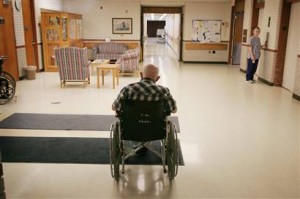Written by Lisa Chedekel
In a rare action, the state Department of Public Health has punished and fined a home health care agency for myriad violations, including misconduct by a home care aide who moved in with a patient and took over the patient’s financial affairs.
The DPH consent order imposed on Maxim Healthcare Services of East Hartford marks the first time in more than two years that the state has issued a fine and corrective action plan for a home health care agency. The DPH, which is charged with inspecting Medicare-certified home health agencies, rarely imposes financial penalties on agencies found with patient-care violations, an October review by C-HIT found. The last DPH consent order involving a home health agency was issued in January 2010, records show.
The new consent order requires Maxim Healthcare to retain an independent nurse consultant to oversee operations and make a number of other improvements, including acting promptly on complaints, investigating all reports of conflicts of interest, and ensuring that nursing staff report changes in patients’ conditions to physicians. It imposes a $7,500 fine.
In lengthy inspection documents, DPH cited the agency for multiple lapses in care, including failing to properly notify patients when services were being reduced or terminated; failing to properly re-evaluate patients’ conditions; failing to maintain a contract for provision of physical, occupational and speech therapy services; and failing to maintain an adequate staffing ratio of supervisors to direct service staff. The agency had one clinical services supervisor responsible for overseeing 22 full-time caregivers; the state requires a ratio of one supervisor for every 15 employees.
In one of the most serious incidents cited, state inspectors determined that the agency had not taken proper action after finding that an aide in 2009 had moved in with a patient who was on a ventilator, then taken over the patient’s financial and health affairs. Maxim’s administrator and regional director acknowledged to DPH that agency staff “were aware of (the aide’s) positions as both the agency employee servicing the patient, and the patient’s primary caregiver.” But the aide was not suspended until after the patient died in 2010, the inspection reports show.
A week after the patient’s death, the agency received a complaint alleging that the aide had abused and neglected the patient. But Maxim could produce no records that it had launched an investigation, and it did not immediately suspend the aide. DPH had cited Maxim in 2010 for
placing patients in “immediate jeopardy”—a serious deficiency—with a directive that the agency promptly pursue investigations of patient-care complaints, the state reports say.
In a separate consent order, the DPH also cited a New Britain nursing home for serious lapses in patient care, including harassment and abuse of a resident by two former staff members.
State reports allege that the assistant administrator and business office manager at Walnut Hill Care Center repeatedly harassed a resident who had objected to a room change, going so far as to move her belongings out to the facility’s loading dock, spy on her when she called the state to complain, and slam the door in her face. State regulators cited Walnut Hill for failing to provide proper oversight in reporting and investigating the allegations of abuse.
The DPH consent order directs the home to hire a temporary administrator, bring on a new director of nursing services and permanent administrator, and pay an $18,200 fine.

